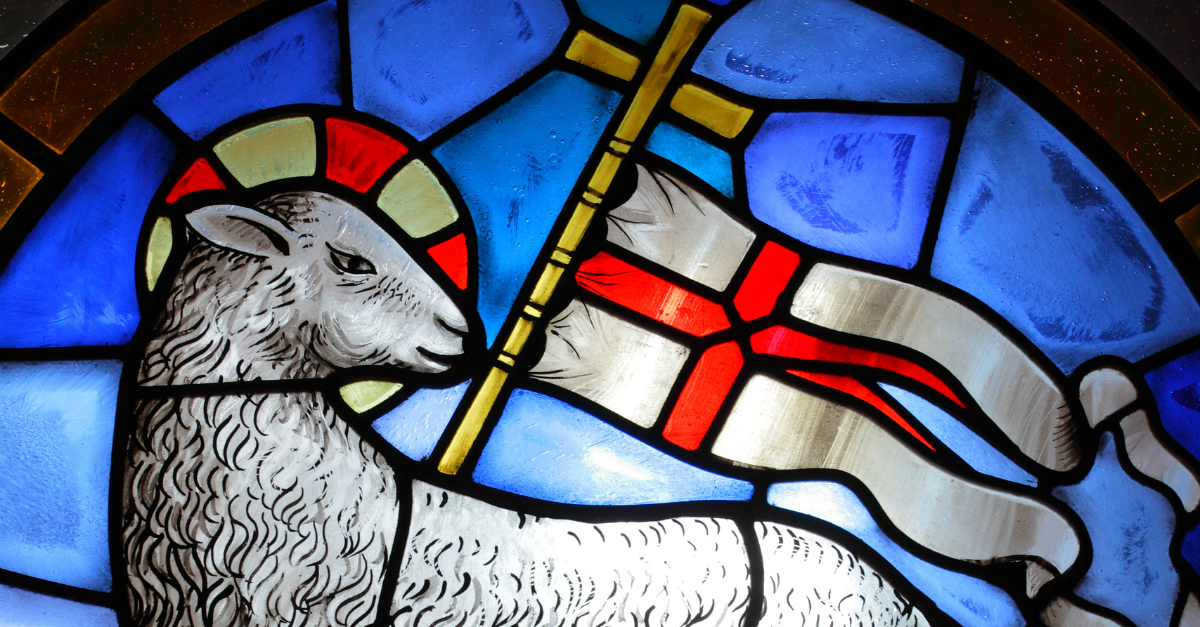Why Is the ‘Lamb of God’ So Significant?

The Bible talks about the “Lamb of God” and often features imagery about lambs. Spiritually, the Lamb of God is incredibly significant because it expresses the core of our faith. Learning why the Lamb of God is so significant can inspire us with awe and deepen our trust in Jesus.
Who Is the Lamb of God?
The phrase “Lamb of God” is a name given to Jesus in the Bible. The Bible first mentions the Lamb of God in John 1:29, where John the Baptist sees Jesus and declares, “Look, the Lamb of God, who takes away the sin of the world!”. John the Baptist continues to testify about Jesus and concludes in John 1:34: “I have seen and I testify that this is God’s Chosen One.” Whenever the Lamb of God appears in the Bible, it refers to Jesus.
What Does the “Lamb of God” Mean?
Jesus as the Lamb of God expresses significant theological and symbolic meaning. It highlights the sacrificial nature of Jesus’ mission as the world’s Savior. Just as lambs – gentle animals who symbolize purity – were offered as sacrifices in the Old Testament to atone for sins, Jesus served as a sacrifice to atone for the sins of humanity. The phrase “Lamb of God” refers to Jesus as the perfect and ultimate sacrifice provided by God for the atonement of the sins of his people.
Why Is the “Lamb of God” So Significant?
Relating to Jesus as the Lamb of God shows us the heart of why our faith is important. It is only by trusting Jesus’ sacrifice for our sins that we can connect with a holy God. Otherwise, we would perish. John 3:16 celebrates the love behind this core sacrifice: “For God so loved the world that he gave his one and only Son, that whoever believes in him shall not perish but have eternal life.” It’s important for us to trust Jesus’ work as the Lamb of God in order for us to be able to enjoy relationships with God and grow in holiness. As the Apostle Paul wrote, “For our sake he [God] made him [Jesus] to be sin who knew no sin, so that in him we might become the righteousness of God” (2 Corinthians 5:21).
Sacrifice is necessary because, as Hebrews 9:22 says, “In fact, the law requires that nearly everything be cleansed with blood, and without the shedding of blood there is no forgiveness.” The entire sacrificial system established by God in the Old Testament prepares the way for Jesus coming to save the world as the Lamb of God. In that system, lambs were often sacrificed in temples as offerings to God to atone for people’s sins. A lamb was sacrificed for the sins of the people every morning and evening in Jerusalem (Exodus 29:38-42). These sacrifices foreshadowed the perfect sacrifice of Christ on the cross that would happen later. Interestingly, Jesus died on the cross at the same time the evening sacrifice was being made in the temple. The Jews at that time were familiar with the Old Testament prophets Jeremiah and Isaiah, who foretold the coming of someone who would be led “like a lamb to the slaughter” (Jeremiah 11:19 and Isaiah 53:7). Isaiah 53:5-6 prophesies about how Jesus’ suffering and sacrifice will redeem people: “But he was pierced for our transgressions, he was crushed for our iniquities; the punishment that brought us peace was on him, and by his wounds we are healed. We all, like sheep, have gone astray, each of us has turned to our own way; and the Lord has laid on him the iniquity of us all.” This person was none other than Jesus, the Lamb of God.
God instructed the Israelites to sacrifice a lamb for the Passover feast (Exodus 12:1-30). The innocent lamb represented purity, and its sacrifice was a symbol of repentance and submission to God's will. Similarly, Jesus’ sacrificial death on the cross to save humanity from sin shows that he is the Lamb of God who makes the ultimate sacrifice necessary to connect sinful humanity to a perfectly holy God. In fact, the slaying of the Passover lamb and applying its blood to the doorposts of the houses powerfully depicts Jesus’ atoning work on the cross. If we trust Jesus as our Savior, we are spiritually covered by his blood, which protects us from spiritual death.

Photo Credit: ©GettyImages/zoom-zoom
Romans 8:1-4 explains how Jesus’ physical sacrifice has made spiritual freedom possible for people: “Therefore, there is now no condemnation for those who are in Christ Jesus, because through Christ Jesus the law of the Spirit who gives life has set you free from the law of sin and death. For what the law was powerless to do because it was weakened by the flesh, God did by sending his own Son in the likeness of sinful flesh to be a sin offering. And so he condemned sin in the flesh, in order that the righteous requirement of the law might be fully met in us, who do not live according to the flesh but according to the Spirit.” Since humanity had sinned in the flesh (physically), and our holy God can’t be corrupted by sin, God made a way for our sins to be atoned for physically so we would no longer be separated from him because of sin. Jesus’ work as the Lamb of God made it possible for all people to enjoy loving relationships with God, despite sin.
1 Peter 1:18-19 celebrates that redemptive work: “For you know that it was not with perishable things such as silver or gold that you were redeemed from the empty way of life handed down to you from your ancestors, but with the precious blood of Christ, a lamb without blemish or defect.” Jesus has provided all we need to be forgiven forever for all of our sins, and he serves as our advocate for everything we need.
The entire chapter of Hebrews 10 describes the importance of Jesus’ work as the Lamb of God who takes away our sins. As Hebrews 10:10 proclaims: “… we have been made holy through the sacrifice of the body of Jesus Christ once for all.” Now, there is no need to sacrifice animals like lambs to God in a temple, because Jesus has provided an everlasting sacrifice on our behalf so we can enjoy relationships with God. The chapter goes on to encourage us to persevere in our faith with confidence because of Jesus’ ultimate sacrifice for us: “Therefore, brothers and sisters, since we have confidence to enter the Most Holy Place by the blood of Jesus, by a new and living way opened for us through the curtain, that is, his body, and since we have a great priest over the house of God, let us draw near to God with a sincere heart and with the full assurance that faith brings, having our hearts sprinkled to cleanse us from a guilty conscience and having our bodies washed with pure water. Let us hold unswervingly to the hope we profess, for he who promised is faithful.”
Not only does the Bible look back to Jesus’ crucifixion as the Lamb of God, but it also looks forward to Jesus as the Lamb of God in heaven. Revelation 5:6 describes Jesus in heaven as “a Lamb, looking as if it had been slain.” This image reinforces the sacrificial nature of Jesus' mission and emphasizes the victory he achieved through his sacrifice. A few verses later in Revelation 5:11-13, the Bible reveals all created beings in heaven and earth – angels, people, and other creatures – worshiping Jesus for his work as the Lamb of God: “Then I looked and heard the voice of many angels, numbering thousands upon thousands, and ten thousand times ten thousand. They encircled the throne and the living creatures and the elders. In a loud voice they were saying: ‘Worthy is the Lamb, who was slain, to receive power and wealth and wisdom and strength and honor and glory and praise!’ Then I heard every creature in heaven and on earth and under the earth and on the sea, and all that is in them, saying: ‘To him who sits on the throne and to the Lamb be praise and honor and glory and power, for ever and ever!’” This passage shows the importance of appreciating the wonder of God’s work and responding to it with gratitude.
Revelation 7:9 shows Jesus in heaven as the Lamb of God, with a huge amount of people whose souls had been redeemed thanks to his sacrifice on earth: “After this I looked, and there before me was a great multitude that no one could count, from every nation, tribe, people, and language, standing before the throne and before the Lamb. They were wearing white robes and were holding palm branches in their hands.” An angel explains to the apostle John in Revelation 17:14 that Jesus, the Lamb of God, will defeat evil and reign victorious over the universe: “They will wage war against the Lamb, but the Lamb will triumph over them because he is Lord of lords and King of kings – and with him will be his called, chosen and faithful followers.”
Conclusion
The Lamb of God refers to Jesus as the perfect and ultimate sacrifice for sin. The significance of the Lamb of God speaks to the core message of Christianity: that through Jesus' sacrifice, we can be reconciled to God and receive forgiveness for our sins. The Lamb of God is significant because it emphasizes Jesus’ sacrificial mission and symbolizes his innocence, purity, and victory over sin and death. As we reflect on the meaning of the Lamb of God, may we be inspired by the great love that God has for us and the price that Jesus paid to redeem us.
Photo Credit: ©GettyImages/KristiLinton

Originally published March 27, 2023.





